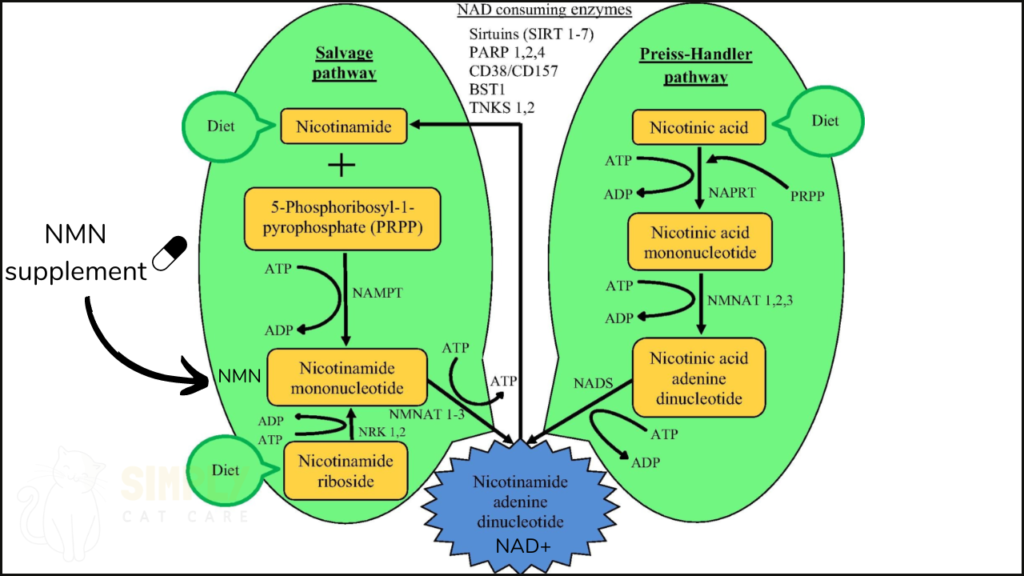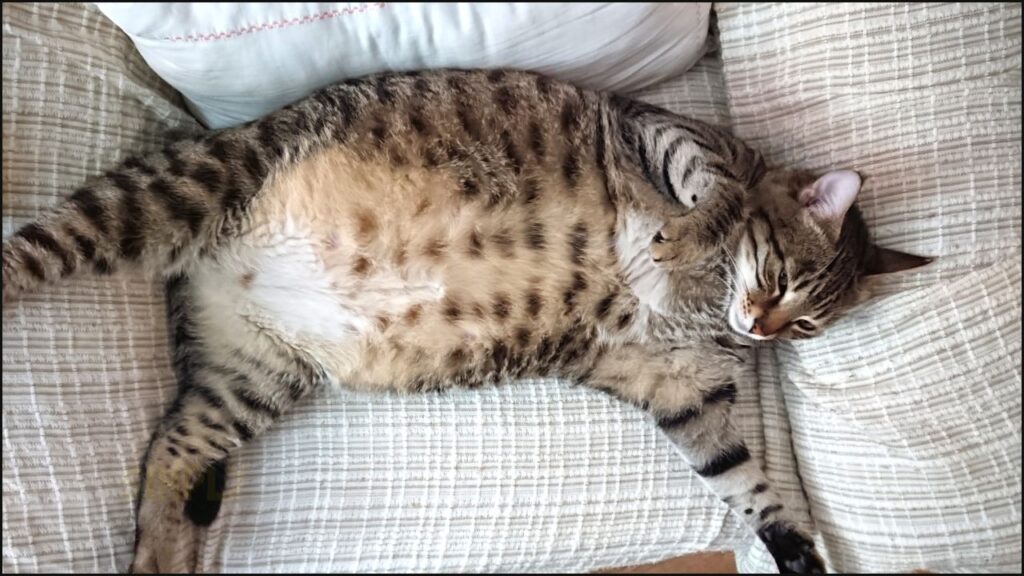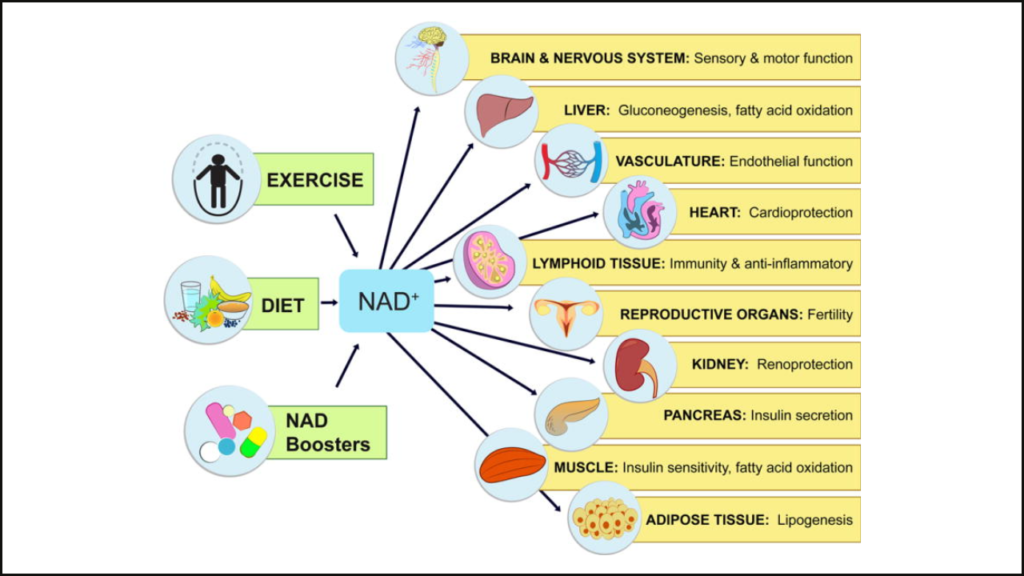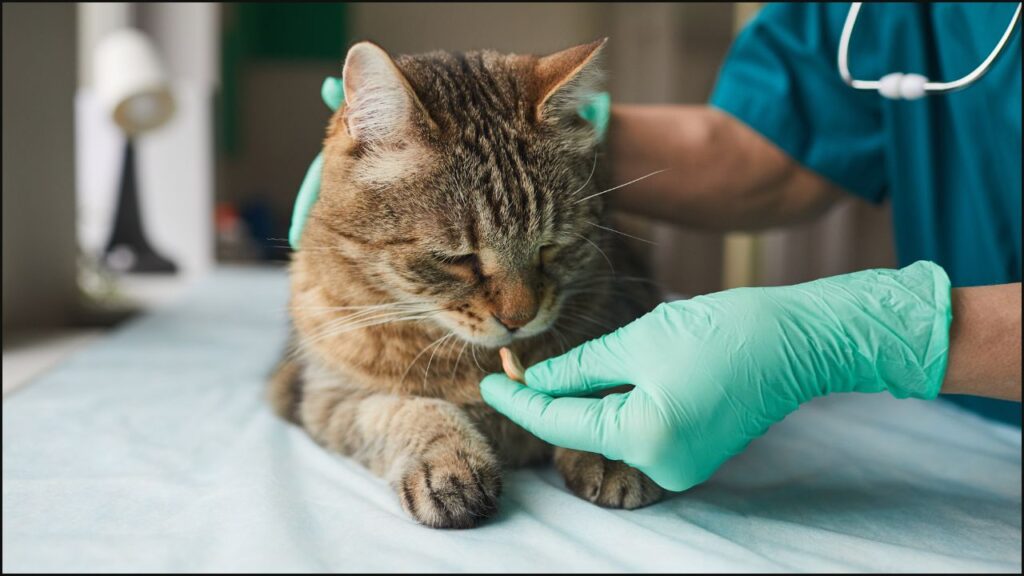Disclaimer: As an affiliate for Renue By Science, I earn from qualifying purchases. This does not impact our reviews and comparisons.
Possibly.
But research is lacking in cats, so weigh up the pros and cons first.
Curious about the latest advancements in health?
Nicotinamide mononucleotide (NMN) is a hot supplement in the human world. It seems to work wonders for boosting health and longevity.
But the question begs: “Can I give NMN to my cat?”
In this article we’ll find out by going through what NMN is, how it works and it’s safety.
That way you’ll know if it’s worth getting in on this for your cats health, or if it’s all a passing fad.
I am not a veterinarian and I recommend seeking the advice of a vet for any further questions. The advice in this article is not intended as medical advice.
Let’s go!
What is NMN?
NMN is a precursor to NAD+ in the body.
NAD+ is a co-enzyme that is vital to energy production.
We don’t need NMN, but the NAD+ which is what helps repair DNA and keep organs healthy.
NAD+ decreases with ageing and NMN helps boost NAD+.
How Do we Make NAD+?
There’s 3 ways to make NAD+ in mammals.
- Tryptophan
- Salvage
- Preiss-Handler
Cats can’t metabolize tryptophan, so won’t get benefit from this (unlike humans).
Instead cats need preformed niacin (nicotinamide) from meat, fish, poultry and organs.
Plant foods like cabbage and broccoli provide NMN in the diet, but in small amounts. Cats also don’t enjoy these foods as carnivores.
NMN is an intermediate molecule in the salvage and Preiss-Handler paths. Most NAD+ if from the salvage path.
Nicotinamide goes to NMN, which goes into NAD.
The Preiss-Handler path is a little more complex, but also arrives at NAD+.

Why Does NAD+ Decrease With Age?
Inflammation and oxidative stress.
They block the enzymes converting dietary niacin to NAD+.
Healthy lifestyle helps increase NAD+ in cats including calorie and weight control.
Learn More:

How Does NMN Increase NAD+?
NMN is one step from NAD+.
That means it doesn’t have go through intermediate steps (like niacin) to go to NAD+.
Research finds NMN supplementation increases NAD+ three-fold.
Benefits of NMN
Benefits include:
- Brain health
- Eye health
- Increased lifespan
- Muscle health
- Better insulin sensitivity
- Kidney health
- Liver health
- Sun UV protection
All of these are attractive benefits to cat owners.
Cats are at a high risk of kidney disease and diabetes.
Could NMN help prevent those issues and other age related ailments?

Can I Give NMN to My Cat?
Possibly.
Unfortunately, there are no studies on NMN given to cats.
Research found 2,666 mg/kg NMN didn’t result in any averse events, toxicity or mortality in rats. Over a 90 day period, 1,500 mg/kg/d was safe.
Long term human studies are lacking over 500mg/kg doses. So it’s hard to say if there’s any health problems from NMN.
Cats have a unique metabolism, deficient in many enzymes needed to clear certain drugs, particularly phenols (high in veggies and fruit). I don’t think this affects NMN since it goes to NAD+.
What about other niacin supplements?
Niacinamide (another NAD+ supplement) raises liver NAD+ 7-fold in cats. This shows that the salvage pathway is active in cats (NMN is downstream in this pathway).
Some vets prescribe niacinamide to lower phosphorus in cats with kidney disease. Doses are 250mg twice daily, which appears safe.
There’s no research in cats though showing this.
Another niacin supplement, nicotinamide riboside (NR), lacks research in cats.
Both NAM and NR may decrease sirtuin function (although some research suggests otherwise).
Sirtuins help with DNA repair and are anti-oxidants. Decreasing them could be a problem.
NMN can increase sirtuin function which researchers think is safer.
A concern of NMN is it may increase cancer risk, although this is not proven with research.

Why Give NMN to Pets?
Improve health and lifespan.
Ageing comes along faster in pets unfortunately.
If NMN can help prevent age related disease (e.g. kidney disease) it also helps save on vet bills.
For something that you could sprinkle in your cats food, NMN seems attractive.
I found one anecdote of an owner of a 20 year diabetic cat going into remission with NMN supplementation. Not a lot to go off, but encouraging.
Gentle reminder:
The leading cause of death in cats is road trauma. Securing your property to prevent escapees is the best way to keep your cat alive longer.
Learn More:
Is NMN Banned?
In some areas, yes.
NMN isn’t available on Amazon, as it’s classed as a drug and not a dietary supplement by the FDA.
This limits the availability of the product, but it is still available in some places.
NMN Supplement for Cats
I take an NMN supplement for myself, but for obvious reasons it’s not suitable for cats with the dose and size.
So I tried looking for a product suitable for cats and found one (untested):
PET NMN Longevity Chews for Cats
Renue By Science are a third party tested facility registered with the FDA. Tested under cGMP conditions.
This means the FDA perform testing of the active ingredients for quality control.
The supplement uses liposomal NMN which may help improve bioavailability by evading digestion.
PET NMN also has added glucosamine and chondroitin, which can improve joint health.
The dosage is 35mg falls under anything potentially toxic with research into rats.
As far as my research goes, PET NMN is the best option I can find if you want to explore NMN for your cat. Talk with your vet about whether NMN is worth taking.
>> Check out PET NMN Longevity Chews for Cats here
Conclusion
NMN is a popular supplement on the market that boosts NAD+ levels and can slow age related decline.
There’s no NMN research on cats as of this articles writing. The drug works in mammals by raising NAD+ and sirtuins needed to repair DNA.
Whether it’s safe long term is not clear. NMN shapes as a promising way to keep your cat healthy as they move into their elder years.
